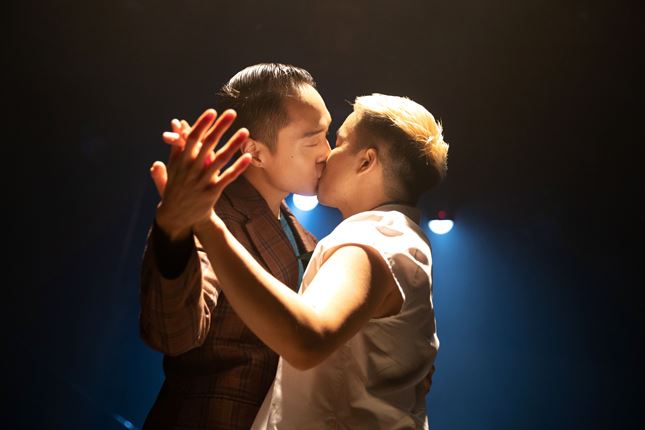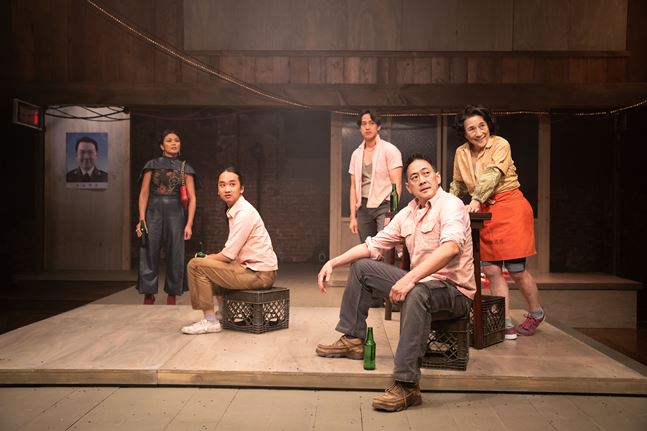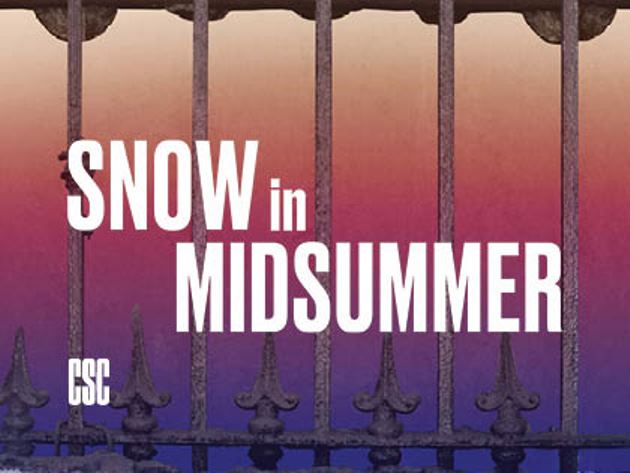A young widow is wrongfully executed for a murder she didn’t commit, precipitating a snowfall in June that bespeaks a heinous miscarriage of justice. Her ghost comes back to haunt the community with the curse of a three-year drought that decimates both the ecology and the economy, until the true killer is revealed, and she is officially proclaimed innocent. That’s the story of Frances Ya-Chu Cowhig’s murder mystery Snow in Midsummer, a post-modern adaptation of the 13th-century Chinese classic The Injustice to Dou Yi That Moved Heaven and Earth by Guan Hanqing, now playing a limited engagement at Classic Stage Company.

Set in present-day China, the current production interweaves the basic points of the original Yuan Dynasty narrative with the parallel 21st-century plotlines of a wealthy businesswoman who buys a factory in the devastated town to mass-produce synthetic flowers, and the gay owner who sells it to her to salvage the local industry and to finance a new life with his partner. But they have their secrets, and the dishonored ghost has other plans.
An efficient artistic design successfully evokes the places and era of the narrative, with Caitlin Murphy serving as prop supervisor. A bi-level scenic design by dots easily shifts from locale to locale (the courtroom and prison, the bar and hospital, and the funerary shrines), and the thrust stage, with seating on three sides, brings the action close to the viewers (including an early break through the fourth wall that features direct interaction with the audience). Johanna Pan’s costumes, along with hair and makeup by Brittany Hartman, clearly indicate the professions and status of the contemporary characters, and Jeanette Yew’s lighting and sound effects by Fan Zhang signal the eerie spectral presence and dark dealings that drive the story.
Theatergoers should take note that the show contains depictions of sexual violence, brutality, and mature language, while exploring the underlying themes of class, misogyny, homophobia, and injustice that still plague contemporary government, the medical profession, and society in general, and is best suited for an adult audience. It also uses haze and strobe effects that could trigger reactions in those who are sensitive.
Dorcas Leung stars as Dou Yi, the innocent widow and vengeful ghost, who is seen in achronological segments before, after, and during her execution. Teresa Avia Lim is the entrepreneur Tianyun, who investigates the hidden facts about the troubling case after her young daughter Fei-Fei, played by Fin Moulding, repeatedly communes with the avenging spirit. And John Yi appears in the central role of the factory’s former owner Handsome Zhang, who has been less than forthright about the backstory of his family, or with his fiancé Rocket Wu, the recipient of a heart transplant, portrayed by Tommy Bo.

Supporting them are Wai Ching Ho in the dual roles of the bar owner Mother Cai and Nurse Wong, and Kenneth Lee, triple cast as Handsome’s murdered father Master Zhang, the unscrupulous Judge Wu, who sentences Dou Yi to death, and Doctor Lu, who performed Rocket’s surgery (a role with which Lee had difficulty, missing many lines at the early press performance I attended). Rounding out the ensemble are Paul Juhn, Julian Leong, and Alex Vinh as the workers and executioners (who share a brazenly callous scene with the corpse of Dou Yi, laughing and taking a selfie – one of the most chilling moments of the show).
The complex and confusing mystery includes flashbacks, plot twists, and unexpected inter-relationships of the characters that are often temporally unclear and hard to follow, until finally disclosed in the surprise ending. Under the direction of Zi Alikhan, the talents of the notable cast are not shown to their best advantage in the problematic staging, which lacks subtlety and emotional depth, with performances that are consistently loud, overblown, and superficial. The actors deliver their lines in a high-volume stilted style that seems more recitative than natural, yelling at each other instead of talking and listening to one another (with the exception of Moulding, who, by comparison, is sometimes hard to hear). The excessive screaming and shouting typify over-the-top melodrama and undermine what would be more effective for me as a hushed haunting presence and stealthy deplorable actions, surreptitiously done in the name of love, power, and/or money.

With that said, the inherent story of Snow in Midsummer – an expression still used in China today to signify an injustice – is intriguing and relevant, with characters that represent the ongoing socio-political abuses of women, the LGBTQ+ community, and the economically disadvantaged, while spotlighting the misuse and exploitation of privilege. The production also resonates with the current rise in deplorable anti-Asian hate crimes in our country. To honor the innocent victims, three “Ghost Chairs” – in a collaboration of CSC with Kalani Van Meter, a student at the School of Visual Arts – have been interspersed throughout the theater and left unoccupied in their memory.
Running Time: Approximately two hours and 15 minutes, including an intermission.
Snow in Midsummer plays through Saturday, July 9, 2022, at Classic Stage Company, 136 East 13th Street, NYC. For tickets (priced at $72-152), go online. Everyone must show proof of COVID-19 vaccination and a valid photo ID to enter the building and must wear a medical grade mask (KN95, N95, KN94, or similar) when inside.





